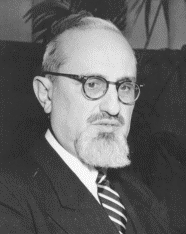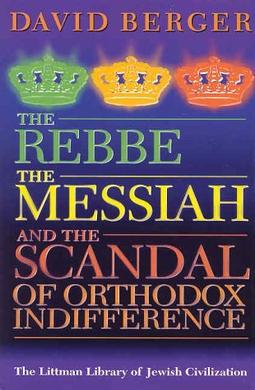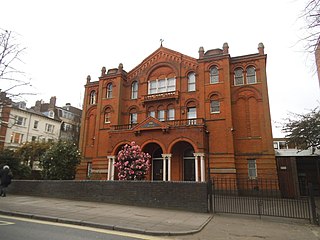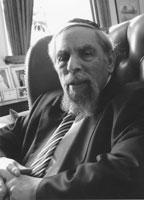We Have Reason to Believe
Most of Jacobs' book titled We Have Reason to Believe [7] deals with such topics as proof of God's existence, pain, miracles, the afterlife, and election: ideas which were not in and of themselves controversial. Debate on the book was eventually to centre on chapters 6, 7, and 8: The Torah and Modern Criticism, A Synthesis of the Traditional and Critical Views and Bible Difficulties.
In these chapters, Jacobs took on discussion biblical criticism. Specifically, Jacobs was concerned with source criticism of the Torah and the documentary hypothesis; the latter of which suggests that the Torah derives from multiple sources rather than having been given, as Orthodox rabbinical traditions have it, complete in its present form by God to Moses during the period beginning on Mount Sinai and ending with Moses's death.
Jacobs comments: "While Judaism stands or falls on the belief in revelation, there is no 'official' interpretation on the way in which God spoke to man". [8] He writes that, "according to some rabbis, [the Pentateuch] was given to Moses at intervals during the sojourn in the Wilderness". He also comments that, given the arguments of textual criticism, "no work of Jewish apologetics, however limited in scope, can afford to fight shy of the problem". [9] Here there is an implied rebuke of the tendency of many Jewish authorities of the period simply to gloss over the inconveniences of the thoughts of the "modern critics" – a rebuke which may have rankled some.
Jacobs concludes: "There is nothing to deter the faithful Jew from accepting the principle of textual criticism". [10] He is aware that "to talk about 'reconciling' the Maimonidean idea and the Documentary Hypothesis […] is futile, for you cannot reconcile two contradictory theories. But to say this is not to preclude the possibility of a synthesis between the old knowledge and the new knowledge". [11]
Jacobs provides numerous examples from the Talmud and other rabbinical writings indicating acceptance of the idea of Divine intervention in human affairs with "God revealing his Will not alone to men but through men". He concludes that, even if the documentary hypothesis is partly (or even entirely) correct,
God's power is not lessened because He preferred to co-operate with His creatures in producing the Book of Books […] We hear the authentic voice of God speaking to us through the pages of the Bible […] and its message is in no way affected in that we can only hear that voice through the medium of human beings. [12]
The "Jacobs Affair"
It had been widely assumed that after Epstein's retirement as principal of Jews' College he would be succeeded by Jacobs. When this assumption was translated into a definite invitation by the College's Board of Trustees in 1961, the then Chief Rabbi of the United Kingdom, Israel Brodie, interdicted the appointment "because of his [Jacobs's] published views". This was a reference to We Have Reason to Believe.
The British newspaper, [13] The Jewish Chronicle , took up the issue and turned it into a cause célèbre which was reported in the national press, including The Times . It was
an event that threatened to become the biggest schism in Anglo-Jewish history. The events in 1964 that came to be known as "the Jacobs Affair" dominated not just the Jewish media but the whole of Fleet Street and the newsrooms of both the BBC and ITN. Not that Jacobs himself was a willing participant in the affair. He was dragged into it by the religious establishment of the day. [14]
When Jacobs wished to return to his pulpit at the New West End Synagogue, [15] Brodie vetoed his appointment. [16] A number of members then left the New West End Synagogue to found the New London Synagogue.
Public interest in Jacobs's differences with the Anglo-Jewish establishment is also demonstrated by the television interview of Dr. Jacobs of 1966 conducted by Bernard Levin.
The New London Synagogue
The defecting congregation purchased the old St John's Wood synagogue building, and installed Jacobs as its rabbi – a post which he held until 2001 [17] and to which he returned in 2005. This congregation, The New London Synagogue, became the "parent" of the Masorti movement in the United Kingdom, which now numbers several congregations. [18]
While holding the position of rabbi at the New London Synagogue, [19] Dr Jacobs was also for many years Lecturer in Talmud and Zohar at the Leo Baeck College, a rabbinical college preparing students to serve as Masorti, Reform and Liberal rabbis in the UK and Europe. Rabbi Jacobs served as Chairman of the Academic Committee for some years.
When the Masorti Movement in Britain was created its founders asked him to be its spiritual guide. Despite his ambivalence about the need and purpose of a new movement, he agreed. But he refused to be regarded as its founder. He always described Masorti as a mood not a movement". [20]
Since the founding of the New London Synagogue, Jacobs and the Masorti movement were subject to hostility from Orthodox British Jewish institutions. On his 83rd birthday, in the Bournemouth United Synagogue on the sabbath before his granddaughter's wedding, Jacobs was not provided the honour of an aliyah customarily given to the father of the bride, which gave rise to heated correspondence in the Jewish press including accusations of pettiness and vindictiveness. [21] The Chief Rabbi, Lord Jonathan Sacks, and the head of the London Beth Din, Dayan Chanoch Ehrentreu, responded that, because of what they considered to be Jacobs's heretical beliefs, "they believed that had Jacobs uttered the words 'Our God […] who gave us the Torah of truth […] ', he would have made a false statement". [22]

Conservative Judaism, also known as Masorti Judaism, is a Jewish religious movement that regards the authority of Jewish law and tradition as emanating primarily from the assent of the people through the generations, more than from divine revelation. It therefore views Jewish law, or Halakha, as both binding and subject to historical development. The conservative rabbinate employs modern historical-critical research, rather than only traditional methods and sources, and lends great weight to its constituency, when determining its stance on matters of practice. The movement considers its approach as the authentic and most appropriate continuation of Halakhic discourse, maintaining both fealty to received forms and flexibility in their interpretation. It also eschews strict theological definitions, lacking a consensus in matters of faith and allowing great pluralism.

In Judaism, the concept of the Jews as chosen people is the belief that the Jews as a subset, via partial descent from the ancient Israelites, are also chosen people, i.e. selected to be in a covenant with God. Israelites being properly the chosen people of God is found directly in the Book of Deuteronomy 7:6 as the verb baḥar (בָּחַר), and is alluded to elsewhere in the Hebrew Bible using other terms such as "holy people" as goy or gentile, Book of Exodus 19:6. Much is written about these topics in rabbinic literature. The three largest Jewish denominations—Orthodox Judaism, Conservative Judaism and Reform Judaism—maintain the belief that the Jews have been chosen by God for a purpose. Sometimes this choice is seen by believers as charging the Jewish people with a specific mission—to be a light unto the nations, and to exemplify the covenant with God as described in the Torah. Isaiah and Jeremiah viewed God's loving choice of Israel as a means to teaching monotheism, combatting idolatry, curbing human arrogance, ending violence, lust, greed, extreme chauvinism and warfare, and ushering in a new society.
Halakha, also transliterated as halacha, halakhah, and halocho, is the collective body of Jewish religious laws that are derived from the Written and Oral Torah. Halakha is based on biblical commandments (mitzvot), subsequent Talmudic and rabbinic laws, and the customs and traditions which were compiled in the many books such as the Shulchan Aruch. Halakha is often translated as "Jewish law", although a more literal translation might be "the way to behave" or "the way of walking". The word is derived from the root which means "to behave". Halakha not only guides religious practices and beliefs; it also guides numerous aspects of day-to-day life.

Judaism is an Abrahamic monotheistic ethnic religion that comprises the collective spiritual, cultural, and legal traditions of the Jewish people. Religious Jews regard Judaism as their means of observing the Mosaic covenant, which was established between God and the Israelites, their ancestors. The religion is considered one of the earliest monotheistic religions in the world.

Judaism does not centralize authority in any single individual or group. The formulation of principles of faith that are universally recognized by all branches of Judaism remains undefined. There is no central authority in Judaism in existence today - although the Sanhedrin, the supreme Jewish religious court, would fulfill this role if it were re-established. Instead, Judaism's principles of faith remain debated by the rabbis based on their understanding of the sacred writings, laws, and traditions, which collectively shape its theological and ethical framework. The most accepted version in extent is the opinion of Maimonides.

Messianic Judaism is a syncretic Abrahamic new religious movement that combines various Jewish traditions and elements of Jewish prayer with Evangelical Protestant theology. It considers itself to be a form of Judaism but is generally considered to be a sect of Christianity, including by all major groups within mainstream Judaism, since Jews consider belief in Jesus as the Messiah and divine in the form of God the Son to be among the most defining distinctions between Judaism and Christianity. It is also generally considered a Christian sect by scholars and other Christian groups.

Joseph Ber Soloveitchik was a major American Orthodox rabbi, Talmudist, and modern Jewish philosopher. He was a scion of the Lithuanian Jewish Soloveitchik rabbinic dynasty.

Jonathan Henry Sacks, Baron Sacks was an English Orthodox rabbi, philosopher, theologian, and author. Sacks served as the Chief Rabbi of the United Hebrew Congregations of the Commonwealth from 1991 to 2013. As the spiritual head of the United Synagogue, the largest synagogue body in the United Kingdom, he was the Chief Rabbi of those Orthodox synagogues but was not recognized as the religious authority for the Haredi Union of Orthodox Hebrew Congregations or for the progressive movements such as Masorti, Reform, and Liberal Judaism. As Chief Rabbi, he formally carried the title of Av Beit Din (head) of the London Beth Din. At the time of his death, he was the Emeritus Chief Rabbi.
A seudat mitzvah, in Judaism, is an obligatory festive meal, usually referring to the celebratory meal following the fulfillment of a mitzvah (commandment), such as a bar mitzvah, bat mitzvah, a wedding, a brit milah, or a siyum. Seudot fixed in the calendar are also considered seudot mitzvah, but many have their own, more commonly used names.

The Rebbe the Messiah, and the Scandal of Orthodox Indifference is a book by Rabbi Dr. David Berger on the topic of Chabad messianism and the mainstream orthodox Jewish reaction to that trend. Rabbi Berger addresses the Chabad-Messianic question, regarding a dead Messiah, from a halachic perspective. The book is written as a historical narrative of Berger's encounter with Chabad messianism from the time of the death of the Lubavitcher Rebbe, Rabbi Menachem Mendel Schneerson in 1994 through the book's publication in 2001. The narrative is interlaced with Dr. Berger's published articles, written correspondences, and transcribed public lectures, in which he passionately appeals to both the leadership of the Orthodox and Chabad communities for an appropriate response to Chabad-Lubavitch messianism.
In Judaism, angels are supernatural beings that appear throughout The Tanakh, rabbinic literature, apocrypha and pseudepigrapha, Jewish philosophy and mysticism, and traditional Jewish liturgy as agents of the God of Israel. They are categorized in different hierarchies. Their essence is often associated with fire. The Talmud describes their very essence as fire.
Conservative Judaism views halakha as normative and binding. The Conservative movement applies Jewish law to the full range of Jewish beliefs and practices, including thrice-daily prayer, Shabbat and holidays, marital relations and family purity, conversion, dietary laws (kashrut), and Jewish medical ethics. Institutionally, the Conservative movement rules on Jewish law both through centralized decisions, primarily by the Rabbinical Assembly and its Committee on Jewish Law and Standards, and through congregational rabbis at the local level. Conservative authorities produced voluminous Responsa literature.
Criticism of Conservative Judaism is widespread in the Orthodox Jewish community, although the movement also has its critics in Reform Judaism and in other streams of Judaism. While the Conservative movement professes fidelity to Jewish tradition, it considers Halakha to be a dynamic process that needs reinterpreting in modern times. The criticism by Orthodox Jews and traditionalists within the movement itself revolves around the following:

Messianism in Chabad refers to the core belief within the Chabad-Lubavitch community—a prominent group within Hasidic Judaism—regarding the Jewish messiah. Central to this belief is the conviction that Rabbi Menachem Mendel Schneerson, the seventh Rebbe of the Chabad-Lubavitch dynasty, is the awaited Messiah who is leading the Jewish people into the Messianic era.

Rabbi Aharon Feldman is an Orthodox Jewish rabbi and rosh yeshiva (dean) of Yeshivas Ner Yisroel in Baltimore, Maryland. He has held this position since 2001. He is also a member of the Moetzes Gedolei HaTorah.
Illui is a young Talmudic prodigy. The Hebrew term is applied to exceptional Talmudic scholars among Jews.
Reuven Hammer was an American-Israeli Conservative rabbi, scholar of Jewish liturgy, author and lecturer who was born in New York. He was a founder of the "Masorti" (Conservative) movement in Israel and a president of the International Rabbinical Assembly. He served many years as head of the Masorti Beth Din in Israel. A prolific writer in both the Israeli and international press, he was a regular columnist for The Jerusalem Post's "Tradition Today" column. He lived in Jerusalem.

New London Synagogue is a Masorti Jewish congregation and synagogue, located in St John's Wood, in the City of Westminster, London, England, in the United Kingdom.












